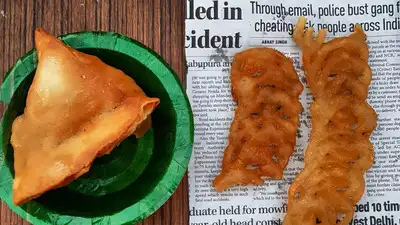ARTICLE AD BOX

Your favourite street snacks—samosas and jalebis—are now being mentioned in the same breath as cigarettes. Nope, this isn’t food snobbery—it’s science. Recent global health findings, including reports from the World Health Organization (WHO), are putting ultra-processed fried and sugary foods on the high-risk list.The message? These foods don’t just make you gain weight—they may quietly increase your risk of serious diseases like heart problems, diabetes, and even early death.Samosas may not come with a warning label (yet), but experts are treating them like edible toxins. Let's unpack why these delicious devils are now a danger.
Why are samosas and jalebis being compared to cigarettes?

According to a WHO Europe report published in June 2024, four industries are behind 2.7 million deaths annually in the region: tobacco, alcohol, fossil fuels, and ultra-processed foods.
And yes, ultra-processed foods include fried snacks and sweets like our beloved samosas and jalebis. (Source – WHO)These snacks may not look like cigarettes, but they work in similar ways—triggering addiction, causing slow, long-term damage, and being aggressively marketed despite health risks. Their high trans fat, refined flour, and added sugar content contribute to obesity, chronic inflammation, insulin resistance, and heart disease over time.
What makes them so dangerous?
Let’s break it down:
- Samosas are deep-fried in repeatedly reused oil (hello, trans fats), and made with refined flour (maida), which has zero fibre or nutritional value.
- Jalebis are soaked in sugar syrup, delivering a blood sugar spike worse than many desserts.
- Both are calorie-dense and nutrient-poor, meaning they fill you up, but don’t fuel your body.
When consumed regularly, these foods cause damage at a cellular level, particularly to your gut, liver, and cardiovascular system. They also activate dopamine receptors, much like cigarettes—creating that instant hit feeling that becomes hard to resist.
Are we being told to quit samosas and jalebis forever?

Not exactly. But: treat these foods like indulgences, not dietary staples. Just like alcohol or cigarettes, moderation matters. The problem arises when these foods become a daily affair—breakfast kachori, lunchtime samosa, and jalebi as a ‘little treat’ every other evening.
Your body doesn’t forget.Instead, the goal is awareness. If we don’t realise these foods are harmful long-term, we won’t make conscious choices about them. And let’s be honest—nobody’s out here binging kale pakoras.Here’s how to enjoy without destruction:
- Limit these foods to once-a-week indulgences.
- Swap deep-fried snacks for air-fried or baked versions.
- Balance meals with fibre, protein, and healthy fats.
- Check labels on packaged sweets or snacks—many are worse than fresh versions.
- Build awareness around food marketing that normalises unhealthy eating.
If you’re craving something fried or sweet, opt for homemade versions with better oils and portion control. Or better yet, train your brain to seek reward elsewhere (hello, dopamine-friendly habits like walking, dancing, or just vibing in the sun).
We’re not saying samosas are evil. We’re saying they’re not harmless. When consumed regularly, snacks like samosas, jalebis, pakoras, kachoris, gulab jamun—all part of our rich food culture—can act like slow-acting poisons for the body. The WHO’s grouping of ultra-processed foods with cigarettes may sound extreme, but it’s rooted in public health impact.So no, you don’t have to quit samosas. But maybe don’t let them show up in your diet more than your leafy greens. Your gut, heart, and future self will thank you.Also read| Are spicy foods good for your health? Science-backed benefits of chilli peppers and capsaicin



.png)
.png)
.png)
















 6 hours ago
4
6 hours ago
4









 English (US) ·
English (US) ·